|
fitness
Snack attack
Most of us tend to crave for foods that are not good for health. With a little thought and planning, one can check this fattening habit
 The urge to munch can
strike you at any time or anywhere. Without any warning, you can be
overcome by an urge to munch. Try as you might, you just can't wish it
away. You know that you have taken a good substantial breakfast, lunch
or dinner, yet you feel this uncontrollable craving for a bar of
chocolate or a packet of chips. The urge to munch can
strike you at any time or anywhere. Without any warning, you can be
overcome by an urge to munch. Try as you might, you just can't wish it
away. You know that you have taken a good substantial breakfast, lunch
or dinner, yet you feel this uncontrollable craving for a bar of
chocolate or a packet of chips.
Weight
gainers
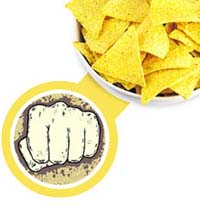 Have you noticed that
you tend to crave for foods that are not good for you? In fact, chips
and chocolates are hardly the nutritious foods. These are the fat
makers, causing our weight to shoot up. When eaten in excess, these
useless treats can only trick us into feeling great as we munch or
drink. Once that is done, all that is left are guilt and anger at your
weakness. Have you noticed that
you tend to crave for foods that are not good for you? In fact, chips
and chocolates are hardly the nutritious foods. These are the fat
makers, causing our weight to shoot up. When eaten in excess, these
useless treats can only trick us into feeling great as we munch or
drink. Once that is done, all that is left are guilt and anger at your
weakness.
With a little thought
and planning before giving in, you can actually stop that fattening
snack habit and continue the good job of managing your weight as well
as your health.
Smart
snacking
The adage "out of
sight, out of mind" can apply towards chips, chocolates and
cookies, especially when you are out shopping for daily groceries.
Perhaps, the best advice that can be offered to a chronic snack eater
is to keep all those fattening goodies out of your home or office
area.
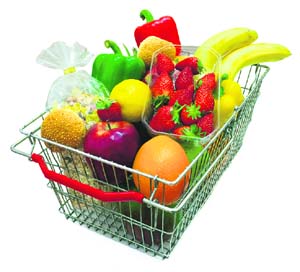 Just before you plan
your shopping, have substantial but healthy breakfast or lunch so that
you will not be swayed to buy everything that you see in the grocery
store. It is a fact that shoppers spend more on food when they are
hungry. But they are more likely to stick to healthy food when they
have had a substantial meal. Just before you plan
your shopping, have substantial but healthy breakfast or lunch so that
you will not be swayed to buy everything that you see in the grocery
store. It is a fact that shoppers spend more on food when they are
hungry. But they are more likely to stick to healthy food when they
have had a substantial meal.
Find your way to healthy
low-fat food section in the shopping mall that will help you eat right
and lose weight at the same time. Fruit, fresh vegetables, chicken,
fish and other less fattening foods are usually found in all super
markets. A cart full of these will help you to avoid pre-processed,
high-sodium, high-fat meat preparations, etc. that will go straight to
your hips and thighs. These unhealthy items will also alter your
cholesterol and triglyceride level.
List
of health
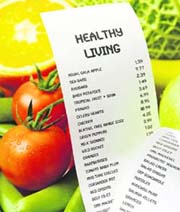 Remember, make a grocery
list and stick to it. This will help you to avoid those troublesome
foods. Foods like chips, fried snacks, soft drinks and colas are best
avoided. These are the kind of foodstuff that you would stock for
company or guests. Unless you have a firm date for a visit by friends
or relatives, chances are that the person that will dig into these
foods will be you and the kids. Very few of us have nerves of steel to
resist these things. So, why tempt yourself? Remember, make a grocery
list and stick to it. This will help you to avoid those troublesome
foods. Foods like chips, fried snacks, soft drinks and colas are best
avoided. These are the kind of foodstuff that you would stock for
company or guests. Unless you have a firm date for a visit by friends
or relatives, chances are that the person that will dig into these
foods will be you and the kids. Very few of us have nerves of steel to
resist these things. So, why tempt yourself?
Nothing
official about it
Home is not the only
place where snacking is a constant temptation. Offices are common
places of diet abuse. Most colleagues share their homemade goodies
with others. At times, you may need a mood lift, when the energy
levels are down. Don't give in to the craving for a sugar rush and
indulge in doughnuts or chocolates or a cup of over-sweetened coffee.
This is the time to have a fruit. An apple or a pear or even a biscuit
will see you through the this danger period. Once you acquire a taste
for the natural goodness of fruit, you will never want to snack on
anything harmful.
 Plan
carefully Plan
carefully
Research has proved that
the evening hours are the most lethal period for your diet. One
returns home from office tired and may be cranky. It is but natural to
want to eat something which gives an instant perk or comfort. Also
most of us flop down in front of TV as soon as we reach home. There is
something about watching television that has that effect on people and
makes them head straight for the snack counter or pantry. It is common
knowledge that a vast majority of us choose to unwind after a busy day
with a bag of chips or other eats. We are hungry after a hard day's
work and the "munch attack" hits us as soon as we enter our
house.
A little preplanning can
avert this crisis easily. Have some fruits or salad vegetables on hand
for times like this. I have often wondered what inspires one to eat
snacks immediately after dinner when you should be full. Perhaps, it
is the television, books or sheer boredom? A sure-fire way to foil
this habit is to nibble on non-buttered popcorns or some dry fruits or
nuts in moderation. Even better will be to be a little strong willed
and sit with a glass of water or green tea. This always comes to the
rescue when you feel the urge to munch. Make this natural wonder drink
work its magic on you.
Yet another way is to
turn to an exercise program. Go for a walk or just get up and be
active and you will be accomplishing far more for your body and mind
than munching ever could.
Diet
awareness
Awareness of diet and
food, regular exercises and commitment play crucial roles in reducing
incidences of obesity, heart diseases, diabetes, osteoporosis and
other degenerative diseases and many other disorders. These disorders
are on the rise mainly due to our affluent lifestyles, poor dietary
habits, lack of exercises and dependence on processed and preserved
foods, rich in sugars, sodium, fats and chemicals. We need to make our
lives disease free and stress free to lead a healthy, happy and long
life.
The writer is one of the
leading holistic health gurus and has a health portal
www.mickeymehtahbf.com
|
Health Capsules
Old
age is a state of mind
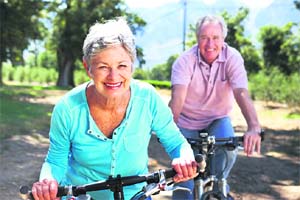 Old age may be a state of mind
as well as the body, say scientists who found that people who
have a younger outlook in life are healthier in old age. A new
study says, older adults who categorise themselves as old and
frail encourage attitudinal and behavioural confirmation of that
identity. Researchers at University of Exeter Medical School
interviewed 29 older adults in the South West of England about
their experiences of ageing and frailty. They found people who
consider themselves to be frail are more likely to abandon
activities which can keep them healthy in old age such as taking
regular exercise. One's attitude could lead to a loss of
interest in participating in social and physical activities,
poor health, stigmatisation, and reduced quality of life,
researchers said. A cycle of decline was also described whereby
perceiving oneself as frail was felt to lead to disengaging in
activities that could reduce the likelihood of frailty, such as
physical exercise, and, in turn, more health and functioning
problems.The study was presented at the British Psychological
Society Annual Conference in Harrogate. Old age may be a state of mind
as well as the body, say scientists who found that people who
have a younger outlook in life are healthier in old age. A new
study says, older adults who categorise themselves as old and
frail encourage attitudinal and behavioural confirmation of that
identity. Researchers at University of Exeter Medical School
interviewed 29 older adults in the South West of England about
their experiences of ageing and frailty. They found people who
consider themselves to be frail are more likely to abandon
activities which can keep them healthy in old age such as taking
regular exercise. One's attitude could lead to a loss of
interest in participating in social and physical activities,
poor health, stigmatisation, and reduced quality of life,
researchers said. A cycle of decline was also described whereby
perceiving oneself as frail was felt to lead to disengaging in
activities that could reduce the likelihood of frailty, such as
physical exercise, and, in turn, more health and functioning
problems.The study was presented at the British Psychological
Society Annual Conference in Harrogate.
Aerobic
exercise may protect the brain from alcohol damage
Aerobic
exercise known to slow cognitive decline may also prevent or
repair damage to the brain caused by alcohol, says a new study.
US researchers found that aerobic exercise may protect white
matter in the brain from alcohol-related damage. Heavy long-term
alcohol consumption leads to neural damage that looks similar to
the decline in neuro-cognitive functioning observed as people
age, said Hollis C Karoly, the University of Colorado at
Boulder. "Given that exercise is protective against some of
the neural and cognitive effects of ageing, it seemed likely
that aerobic exercise may also work to reverse or prevent some
of the damage to the brain caused by chronic alcohol
consumption," Karoly said. Karoly and her colleagues had 60
participants (37 men, 23 women), drawn from a larger database,
undergo a diffusion tensor imaging session. "For
individuals with low levels of aerobic exercise, heavy drinking
was linked to poorer white matter health, but for those with
greater exercise involvement, the relationship between alcohol
and white matter health was not as strong," experts said.
This suggests that individuals who have experienced
alcohol-related brain problems could possibly use exercise to
help recover those effects.The study will be published in the
journal Alcoholism: Clinical & Experimental Research.
Obesity
fork on sale
An electronic fork that
vibrates when you eat too fast is finally on sale on Kickstarter
with its inventors claiming it can help combat obesity and
digestive issues. Those who contribute at least $ 89 on the
crowd-funding website will get a HAPIfork, ahead of its planned
general release to consumers in the US and Europe later this
year.
Social
media can support healthiness of senior citizens
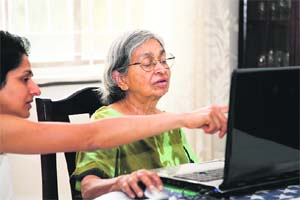 The use of social media by
older people can offer valuable additional support in cases of
sickness and diseases, a new research by Dr Anja Leist from the
University of Luxembourg's Research Unit INSIDE, has concluded.
With the rise of user-friendly devices such as tablets and other
web-enabled devices, older adults now engage in social media,
such as online social networks, discussion boards, and online
forums, more frequently. The study said that with the successful
use of a computer or web-enabled device, older adults report
enhanced feelings of control and self-efficacy, but social media
provides even more benefits for older adults. Dr Leist said
older adults can use social media to access health-related
information and engage in patient-to-patient or patient-doctor
conversations. There are many online forums where people in
difficult life situations, such as informal caregivers of a
spouse with dementia or individuals with depression, can
exchange thoughts as well as receive The use of social media by
older people can offer valuable additional support in cases of
sickness and diseases, a new research by Dr Anja Leist from the
University of Luxembourg's Research Unit INSIDE, has concluded.
With the rise of user-friendly devices such as tablets and other
web-enabled devices, older adults now engage in social media,
such as online social networks, discussion boards, and online
forums, more frequently. The study said that with the successful
use of a computer or web-enabled device, older adults report
enhanced feelings of control and self-efficacy, but social media
provides even more benefits for older adults. Dr Leist said
older adults can use social media to access health-related
information and engage in patient-to-patient or patient-doctor
conversations. There are many online forums where people in
difficult life situations, such as informal caregivers of a
spouse with dementia or individuals with depression, can
exchange thoughts as well as receive
Fish oil can prevent premature birth
Premature births can be
prevented by taking oily fish supplements, says a new study by
an Australian scientist, Maria Makrides, University of Adelaide,
while studying the effect of omega 3 supplements on post-natal
depression and neuro-development in young kids. Fish oil
supplements in pregnancy do not prevent post-natal depression.
Neither do they aid development in children. They do, however,
prevent "very early pre-term" birth," the study
said. Very early pre-term has been defined as a birth before 34
weeks of gestation while normal full-term pregnancy lasts from
37 to 40 weeks. The study involved 2,400 women and has been used
to support international research.The research indicated omega-3
supplements made pregnancy last longer, allowing more growth and
development time for the baby. Omega-3 fatty acids are found in
oily fish such as tuna and salmon. Women who took the
supplements tended to have slightly larger and heavier babies
and gave birth some days later than the placebo group. —
Agencies |
|